Tobacco Mosaic Virus In Cannabis: Everything There’s To Know About The Dangers Of TMV
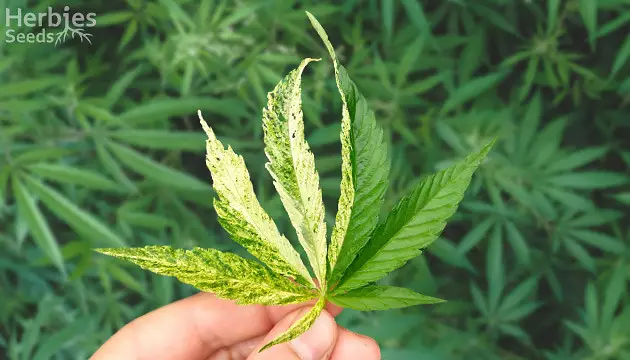
One of the oldest plant viruses around is the tobacco mosaic virus (TMV). In fact, it’s said to be the first plant virus to ever be discovered when it began infecting tobacco plants in 1892. What’s worse is that TMV doesn’t just affect tobacco plants. During its long reign, the virus has been known to affect tomato, pepper, eggplant, spinach, and cannabis plants. Since we’re still talking about the tobacco mosaic virus in 2020, it’s obvious that a ‘cure’ has not yet been found. So, what can growers do if their crop is affected by a virus that can stunt growth and reduce yields? Here’s your ultimate guide to TMV cannabis so you can become familiar with how exactly the tobacco mosaic virus spreads and what to do about it when it does.
What Is Tobacco Mosaic Virus?
Tobacco mosaic virus, aka TMV, is a virus that can negatively affect the growth and output of the plants it infects. The virus is most commonly found in the tobacco plant, hence its name. However, as TMV continues to grow, it’s been found capable of infecting other plants, too. Most recently, it’s been discovered to infiltrate cannabis crops. While the virus won’t affect the grower personally, as we’ve mentioned, it can definitely impact your plants.
TMV can live or be found in:
- The coating of seeds
- Plant debris
- Contaminated soil
- Manufactured tobacco goods
Certain insects can also carry the virus, but in terms of cannabis, the somewhat common aphids have not been one of them.
Signs And Symptoms Of TMV
When infected with the tobacco mosaic virus, weed plants will display a few signs or symptoms. The first sign will show up in the coloring of the leaves, hence the term ‘mosaic’ in the name. The infected cannabis leaves will begin showing mottled areas, like the art form with the same name. These areas will be spotted and striped with dark green, light green, and sometimes even yellow shades. TMV-infected cannabis will also affect the texture and shape of the leaves. The leaves will twist, distort, curl, or even appear to be burned on the edges. Some darker areas of the leaf may become unusually thick. Other signs of tobacco mosaic virus weed plants include:
- Stunted and slowed plant growth, with possible wilting
- Stems weakening or changing to a red or purple color
- Smaller than usual buds
How Does TMV Spread?
To understand TMV completely, you also need to understand how the virus spreads. So far, we’ve touched upon the fact that aphids do not carry or spread the virus. But what about other insects? Research is showing that pollinators like bumblebees may spread the virus, as can grasshoppers. However, the tobacco mosaic virus is mostly spread through the air and via direct touch, such as an infected leaf touching another or infected tools being used and kept in the same area as your crop.
The most common and preventable way for TMV to spread is through workers who smoke. If you smoke cigarettes, the virus can be found on your fingers and even clothing. To avoid the spread of TMV, cannabis growers can follow a few simple steps to properly sterilize themselves and their tools:
- Sterilize scissors, trimmers, and other tools with a milk and water solution (20% powdered milk to 80% water).
- If you smoke, wash or sterilize your hands after each cigarette before working in your garden.
- Wash your clothes with regular laundry detergent (or a milk solution) after each time in the garden or infected area.
The Mystery Of TMV In Cannabis
Even though many cannabis plants have shown symptoms of TMV, experts aren’t 100% convinced that TMV can actually infect cannabis plants – confusing, to say the least. In a few cases, suspected TMV-infected cannabis plants have been tested for TMV and have come back negative. While this may seem promising, it doesn’t support ignoring the signs of tobacco mosaic virus weed plants completely. You’ll just want to ensure that you check other common issues that have symptoms similar to TMV before taking the appropriate action to rid the plants of this infectious virus.
Common Cannabis Issues With Similar Symptoms To TMV
Before taking extreme measures for treating TMV-infected cannabis plants, there are a few similar symptoms of other common issues you should investigate first. Here’s a breakdown of mosaic virus cannabis symptoms that could actually be something else.
Thrips
Thrips are a common pest in cannabis that aren’t too detrimental to crops but should be monitored closely anyway. These small insects feed off of the sap of the plant, and can be especially harsh on small plants or young seedlings. The damage caused by thrips is eerily similar to the kind of spotting that occurs with tobacco mosaic virus-infected weed plants. Thrips cause cannabis leaves to turn a ‘shiny’ consistency by sucking the sap out of leaves, and will leave brown or silvery spots where they do so.
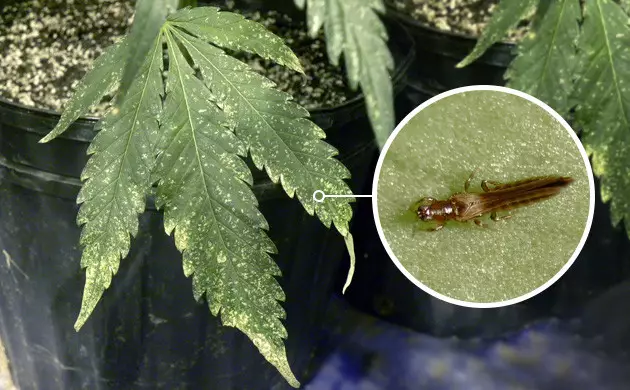
Incorrect pH
Imbalanced pH levels produce symptoms that may mimic those of many other conditions, making it hard to decipher between them. When pH levels are incorrect, you’ll notice the following symptoms:
- Tan and brown spotting on leaves
- Yellowing of leaves
- Drooping of leaves and growth
- Stunted growth
- Blighted tips of leaves
- Unusual stem development
As you can see, these symptoms are quite similar to those of TMV-infected cannabis plants. Thoroughly monitor and adjust your pH levels to ensure this isn’t the source of your issues before deciding whether your plant is actually infected with the tobacco mosaic virus.
Watering Problems
When overwatering or underwatering your cannabis plants, they’ll also show similar symptoms to the tobacco mosaic virus. If you’re watering your plants improperly, leaves can wilt or droop, curl, turn yellow, change in texture (firmer when overwatered, thinner when underwatered), and produce brown spots on leaves. Adjust your watering cycle if you see any of these signs first, and keep your fingers crossed that this simple solution is the case rather than a TMV cannabis plant infection.
Genetics
With cannabis, sometimes it’s not about what you do, but where your plant came from, as lineage and genetics play a huge part in the appearance and growth of a plant. If you’re growing just ‘bad’ or unproven genetics, plants will often show symptoms of nutrient deficiencies, even though one doesn’t exist. The genes may suffer from mutations or warping that causes weakness and issues with flowering that are similar to those of TMV.
Deficiencies
Last but not least are deficiencies with feeding and nutrients that cause similar side-effects to tobacco mosaic virus weed symptoms. When your cannabis plant isn’t receiving an ample amount of nutrients, new growth can be thick like TMV-infected leaves, and twisted or warped as well. Weakening stems will occur, and leaves will start showing yellow tips or random brown spots.
Tobacco Mosaic Virus In Cannabis: Is There A Cure?
The reason why the symptoms of other common issues are so important is that once you’ve diagnosed your plant as having the tobacco mosaic virus, there’s no turning back. Currently, there is no cure for treating TMV cannabis infections or any other plant it can infect. If you’ve got an infestation of the virus, unfortunately, the plants must be quarantined or discarded altogether. Before beginning a new crop, full sanitation of the room, area, and tools is necessary.
TMV: The Virus To Avoid
While COVID-19 is the latest virus for humans to avoid, TMV is a virus that plants and growers should likewise avoid at all costs. So, now that you know more about the tobacco mosaic virus cannabis-wise, you can take extra steps for precaution and prevention, while also knowing how to detect the disease when all other common issues aren’t to blame.
Herbies Head Shop expressly refuses to support the use, production, or supply of illegal substances. For more details read our Legal Disclaimer.


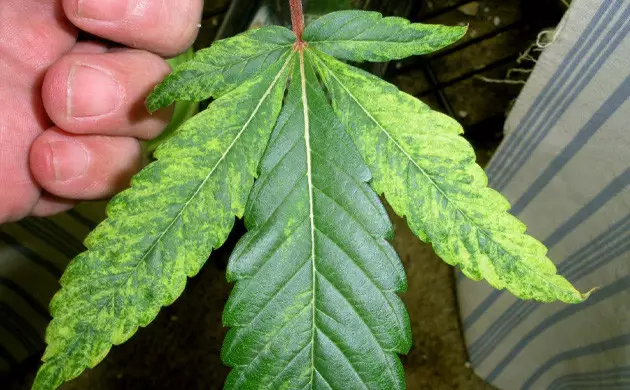
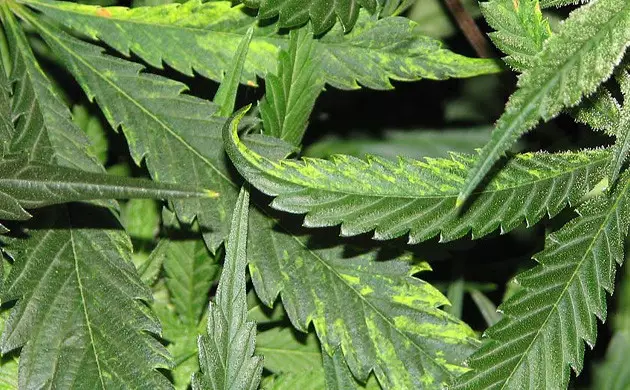
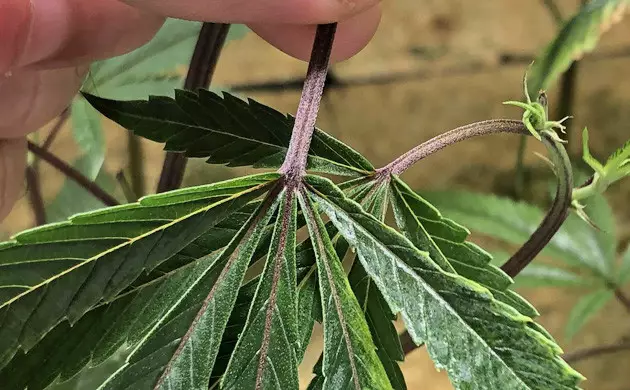
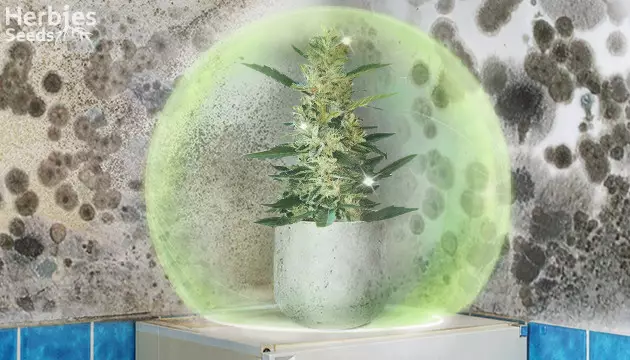











Thank you for leaving a comment for us!
Your feedback will be posted shortly after our moderator checks it.
Please note that we don’t publish reviews that: